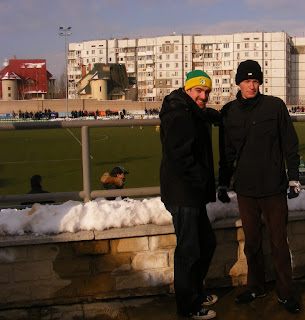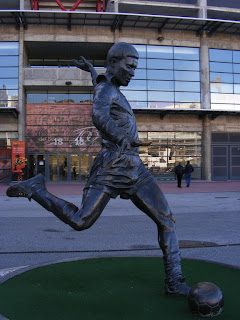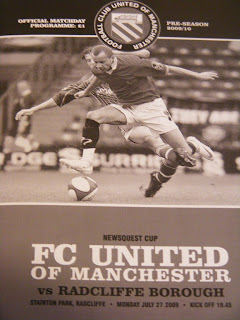
On a good day you can get from Odessa to Chişinău, the capital city of
Moldova, in around four hours. On the day we chose to travel it took us
over six. The road was rutted, pot-holed and covered with falling snow.
'Quality and Comfort' said a sticker on the side of the bus, but my seat
was stuck in a permanent half-recline and the air was so cold that
nobody took their hat or gloves off. The driver had a black leather cap
pulled down low over his sunglasses, a cigarette in one hand and a
mobile phone permanently wedged in the other. "When I was in India,"
began a loud North American voice from the very back of the bus. At the
border there was nothing except brown, ice-coated puddles, an emaciated
dog and a concrete toilet block, where we paid the equivalent of 18p to
urinate down a skittle-shaped hole in the ground. Four men in combat
fatigues and fur hats watched over the queue from the inside of a jeep.

Chişinău's no Prague. The city was hit by an earthquake in 1940 and
most of what was left standing was soon flattened by one or other of
the German, Romanian or Soviet armies. We covered the sights in an
afternoon: stone statues and glass casinos, rubble and squash courts
where Moldova once held Scotland to a 1-1 draw, an Orthodox cathedral
and a smallish arch built to celebrate a dead Tsar's victory over the
Turks. We ended up watching the Premier League on a big screen in the
Carlsberg Pub on Bucuresti, which had a nylon England flag hanging from
the ceiling and a Tranmere Rovers fan at a table upstairs. Several beers
later we decided it would be a good idea to attempt the forty-five
minute walk back to the hotel. We only made it as far as the Hotel
National before getting stopped by the police. "Passports," one said in
Russian, sliding his leg out of the car door. As we handed them over
disappointment slowly clouded his face. "Where are your girls?" he
asked, changing tack. "What have you been drinking? Why aren't you
drunk?" He closed the passports and put them in his pocket. "How about
we go for a drink?" We laughed, nervously. "But you're driving, aren't
you?" "Not tomorrow we're not," pointing at his partner, who'd got out
of the car and was standing with his arms folded across his chest.
"We're busy then." "Doing what?" "Erm, we're watching Zimbru against
Otaci." He stared at each of us in turn, exchanged a look with his
partner, and handed back the passports with only half a smile.

Manic scenes outside Zimbru Stadium.
It's no surprise they didn't fancy tagging along. You wouldn't have called FC Zimbru Chişinău's game against Nistru Otaci the match of the day in Moldova, let alone the rest of Europe. Zimbru won eight of the first nine Divizia Naţională titles after
Moldovan independence, before Sheriff, the second largest company in the
breakaway territory of Transnistria, started bankrolling FC Sheriff
Tiraspol. Zimbru hadn't managed as much as second place ever since and
were way down in sixth before kick-off against Otaci, a small-town team
from the far north of the country who were unsurprisingly bottom of the
league. "You do know the game's on at the small ground?" asked the
elderly woman who sold us our 10 Lei (50p) tickets. There was snow all
over the new national stadium, so the game had been moved to a training
pitch around the back. With an hour to go until the game kicked off we
retreated to a sports bar just across the road. When we left, everyone
else stayed behind to watch Rubin Kazan play CSKA Moscow in the Russian
Super Cup.
There were only a few hundred people in the temporary stands and
most of those who spoke English soon found their way towards our seats.
"You will laugh when you hear how much these players earn," said a man
in a ski hat and football boots who'd just grabbed my shoulder and told
me to call him Victor. "Can you imagine only $400 a month? No, you
can't! And do you see the man eight along on the bench? He was the top
striker in 2008 but he likes women and casinos too much." "Who's the
best player now?" we asked, and two people behind us laughed out loud in
reply.
"It's in the small stadium today," said the woman selling tickets. The
main Zimbru Stadium has seats for 10,600 people and is home to Zimbru,
the Moldovan national team and the local branch of the Norwich City fan
club.
As Otaci had travelled without a
goalkeeper, a reserve defender had been made to play there instead.
The top he'd been given was at least one size too big, his gloves were
so small he took them off before half time and whenever he made a save
the crowd burst out laughing while Zimbru's players stomped on the
ground in disgust. "He was playing in the first team before," Victor
told me, "but then they bought the two Africans. They're here for three
games. It's a kind of corruption." Neither of the foreigners was half as
good as Zimbru's number nine. "Who's he?" I asked Victor. "Nobody."
There
wasn't much of an atmosphere beyond a few dozen fans chanting 'Zim-bru
Ki-shi-nau, Zimbru Ki-shi-nau' on the other side of the pitch. By
half-time even they'd got bored and started throwing snowballs at each
other instead. Deciding against Victor's offer of lemon tea and half a
slice of processed cheese, I spent the interval in the toilets
attempting to ward off frostbite with the aid of a malfunctioning
hand-dryer.
Two-one up at the break, Zimbru finally brought on their
casino-loving striker midway through the second half. He jogged around
for a few minutes, did nothing at all for the next twenty, and then
scored with a tap-in right on full-time. Zimbru's third goal had come
five minutes earlier, by which time half the crowd, including Victor,
had already left. "Moldovan football," he laughed. "Once is enough."
Date: 6th March 2010
Admission: 10 lei (50p)
 A slightly less impressive view of the place.
A slightly less impressive view of the place.
 After the half-time rush for lemon tea and baguettes.
After the half-time rush for lemon tea and baguettes.
 Waiting for the full-time whistle.
Waiting for the full-time whistle.
 Or about all that's currently left of it. Originally built in the 1930s, the ground is on the edge of Taras Shevchenko Park, a tree-lined scrub land popular with drunks, families and stray dogs. After sluggish building work cost the city the chance of hosting Euro 2012, the redevelopment of the 35,000-capacity stadium won't now be completed for at least another year. Until then the local team are playing at the two-sided Spartak Stadium, a few hundred metres seawards of the city's main railway station - where their last game got a crowd of under three thousand.
Or about all that's currently left of it. Originally built in the 1930s, the ground is on the edge of Taras Shevchenko Park, a tree-lined scrub land popular with drunks, families and stray dogs. After sluggish building work cost the city the chance of hosting Euro 2012, the redevelopment of the 35,000-capacity stadium won't now be completed for at least another year. Until then the local team are playing at the two-sided Spartak Stadium, a few hundred metres seawards of the city's main railway station - where their last game got a crowd of under three thousand.  Odessa's Spartak Stadium "was opened in 1928 as a dedication to the 10th anniversary of the Komsomol and was considered the most modern stadium in the city at the time seating 10,000 spectators," says its entry on Wikipedia. Now down to 6,000 and home to the city's rugby team, it's not on the list for 2012.
Odessa's Spartak Stadium "was opened in 1928 as a dedication to the 10th anniversary of the Komsomol and was considered the most modern stadium in the city at the time seating 10,000 spectators," says its entry on Wikipedia. Now down to 6,000 and home to the city's rugby team, it's not on the list for 2012.















